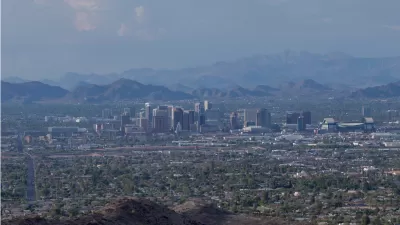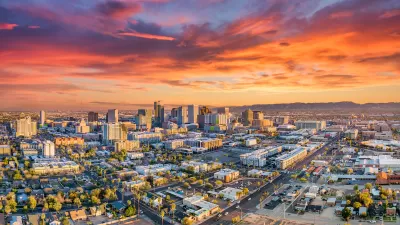Convention and arts centers are costly and lose lots of money, but cities still build and advocate for them.

Jen Fifield reports that cities across Arizona own event spaces that are expensive to build and manage and end up losing money. Mesa, Glendale, Phoenix, Tempe, and Scottsdale have public facilities whose bottom lines that have resulted in huge annual losses — from hundreds of thousands of dollars into the millions.
Cities make up the deficits through taxes and other funding. Some have turned over management to private companies or nonprofit organizations.
Arizona cities are willing to take a hit on these spaces because of what are seen as the larger benefits, says Fifield:
City officials across the Valley say looking simply at direct revenue the spaces bring in doesn't show the whole picture. The venues attract people to the city, who then spend money on food, travel and hotels. That outside revenue, city officials say, brings in more than enough to make up for the cost.
This phenomenon is not particular to Arizona. Cities across the country have ramped up construction of convention space, even when the cost is substantial and the demand is not apparent.
“[Heywood] Sanders has argued in academic papers and a book he wrote called ‘Convention Center Follies’ that although government officials always claim ancillary benefits from building, expanding and operating the spaces, they are expensive and rarely fulfill their promises,” says Fifield.
FULL STORY: Phoenix-area cities want to offer space for events, but they're all losing money doing it

Alabama: Trump Terminates Settlements for Black Communities Harmed By Raw Sewage
Trump deemed the landmark civil rights agreement “illegal DEI and environmental justice policy.”

Study: Maui’s Plan to Convert Vacation Rentals to Long-Term Housing Could Cause Nearly $1 Billion Economic Loss
The plan would reduce visitor accommodation by 25% resulting in 1,900 jobs lost.

Planetizen Federal Action Tracker
A weekly monitor of how Trump’s orders and actions are impacting planners and planning in America.

Wind Energy on the Rise Despite Federal Policy Reversal
The Trump administration is revoking federal support for renewable energy, but demand for new projects continues unabated.

Passengers Flock to Caltrain After Electrification
The new electric trains are running faster and more reliably, leading to strong ridership growth on the Bay Area rail system.

Texas Churches Rally Behind ‘Yes in God’s Back Yard’ Legislation
Religious leaders want the state to reduce zoning regulations to streamline leasing church-owned land to housing developers.
Urban Design for Planners 1: Software Tools
This six-course series explores essential urban design concepts using open source software and equips planners with the tools they need to participate fully in the urban design process.
Planning for Universal Design
Learn the tools for implementing Universal Design in planning regulations.
Caltrans
Smith Gee Studio
Institute for Housing and Urban Development Studies (IHS)
City of Grandview
Harvard GSD Executive Education
Toledo-Lucas County Plan Commissions
Salt Lake City
NYU Wagner Graduate School of Public Service




























